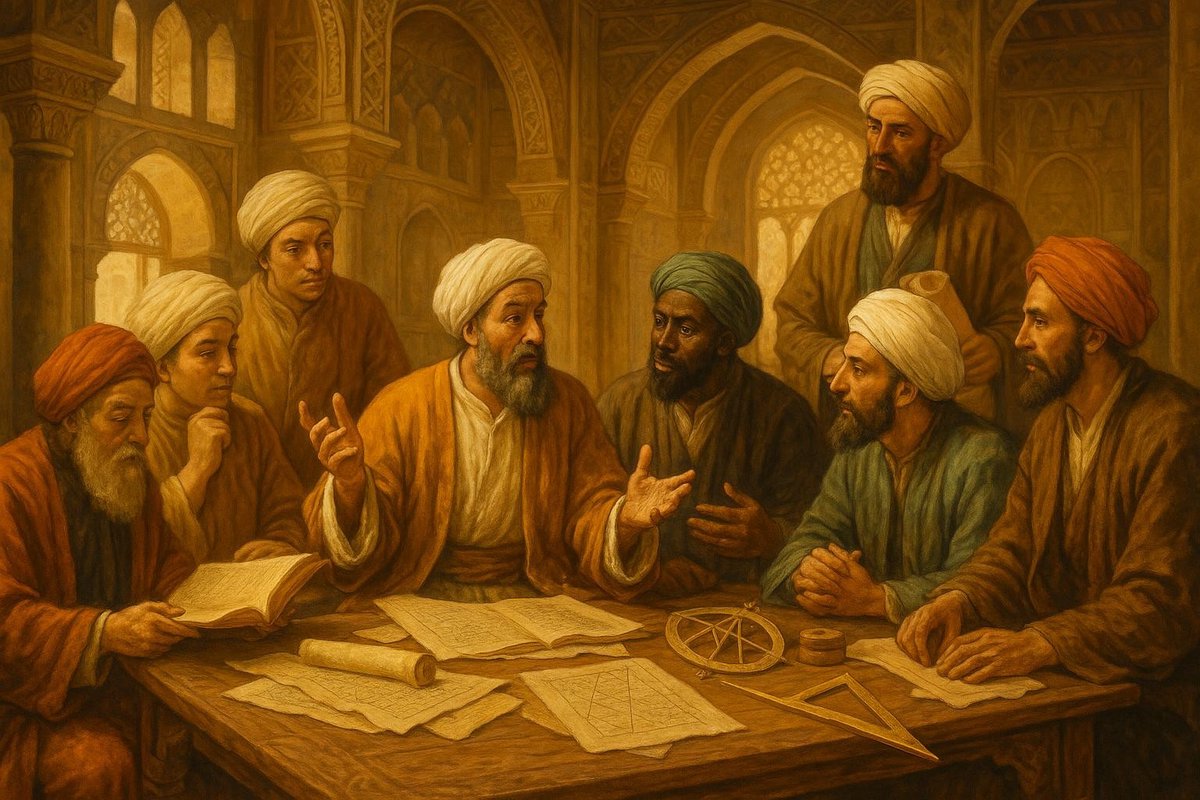
Imagine a world where numbers could not express what we now take for granted: variables, equations, and unknowns. Before algebra, mathematics was largely arithmetic and geometry, with rigid limitations. But then, in the bustling scientific academies and vibrant universities of the Islamic Golden Age, a revolution unfolded—one that would forever change our approach to problem-solving.
Origin of Algebra
In around the 9th century, the seeds of algebra were sown in the fertile intellectual environment of Baghdad. This city was home to the House of Wisdom, a revered institution of learning where scholars from diverse backgrounds gathered to exchange ideas.
- Al-Khwarizmi, a Persian scholar, is often credited with introducing algebra to the world.
- The word ‘algebra’ itself originates from his book, “Al-Kitab al-Mukhtasar fi Hisab al-Jabr wal-Muqabala,” which translates to “The Compendious Book on Calculation by Completion and Balancing.”
- This treatise laid the foundation for solving linear and quadratic equations, transforming how people engaged with numbers.
The House of Wisdom fostered a unique environment that nurtured intellectual curiosity and collaboration, serving as a bridge between ancient mathematical traditions from Greece and India and the emerging Islamic scholarly pursuits. Without such institutions, the development and dissemination of algebra might have been vastly different, possibly delayed by centuries.
Key Figures in the Development of Algebra
Several key figures played pivotal roles in the evolution of algebra, each contributing their unique insights and building upon the work of their predecessors.
- Omar Khayyam, a Persian polymath of the 11th century, expanded on Al-Khwarizmi’s work, developing geometric solutions to cubic equations.
- By the 16th century, European scholars like René Descartes and François Viète further advanced algebra by introducing symbolic representation, which made complex calculations more manageable.
- Interestingly, these developments were made possible by the thriving intellectual exchanges between the Islamic world and Renaissance Europe.
This collaborative spirit between cultures and across time underscores the importance of academic institutions as hubs of knowledge exchange, where scholars could stand on the shoulders of giants and reach new heights.
A Turning Point: Transition from Arithmetic to Algebra
The transition from arithmetic to algebra marked a significant turning point in the history of mathematics. Before algebra, calculations were restricted to specific numbers and geometries.
- With algebra, scientists and mathematicians could generalize solutions, allowing problems to be expressed in terms of variables and equations.
- This shift enabled the abstraction necessary for scientific advancements during the Renaissance and Enlightenment periods.
- The translation of Arabic texts into Latin in the 12th century served as a catalyst, bringing the revolutionary ideas from the House of Wisdom to Western Europe.
Institutions like the University of Bologna and the University of Paris became centers for the new mathematical teachings, pushing boundaries beyond what was previously conceivable. The institutional focus on education and research paved the way for algebra’s integration into the broader scientific curriculum.
Impact on the World: Algebra’s Enduring Legacy
Algebra’s discovery did more than just advance mathematics; it changed the world in profound ways.
- From engineering marvels to economic models, algebra underpins much of the modern world.
- Its principles are vital in fields like physics, chemistry, and computer science.
- No wonder algebra is often seen as a universal language of problem-solving.
As time goes on, algebra continues to evolve, driven by the same spirit of inquiry and innovation that sparked its inception. Today, the legacy of those early institutions persists in universities and academies worldwide, where the next generation of mathematicians continues to build upon this foundational discipline.
In conclusion, the discovery of algebra was not just a mathematical breakthrough; it was a cultural and intellectual milestone. Its origins lie deep within the halls of historic institutions that prioritized knowledge and collaboration.
Fuel Someone Else’s Curiosity
Feel inspired by the journey of algebra? Share this article with friends and spark a conversation about how educational institutions have shaped human progress. Your curiosity could be the catalyst for someone else’s exploration.

Leave a Reply